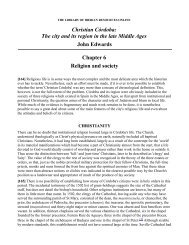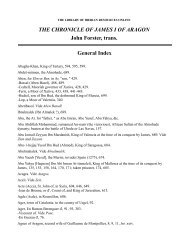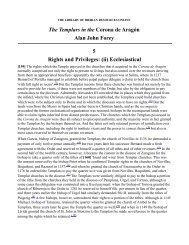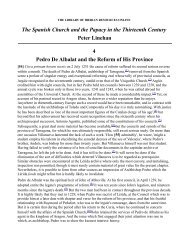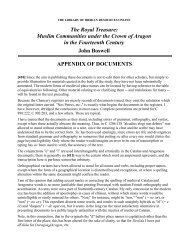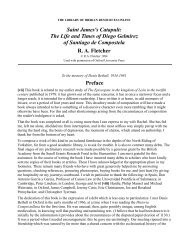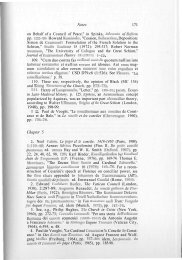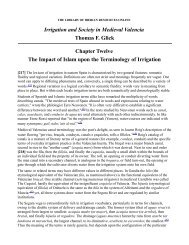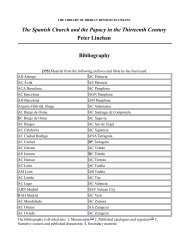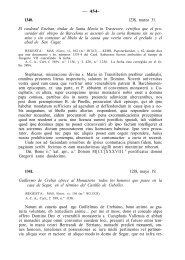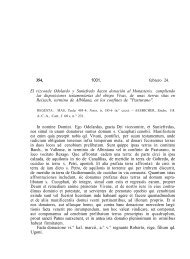PROTESTANTISM - The Library of Iberian Resources Online
PROTESTANTISM - The Library of Iberian Resources Online
PROTESTANTISM - The Library of Iberian Resources Online
You also want an ePaper? Increase the reach of your titles
YUMPU automatically turns print PDFs into web optimized ePapers that Google loves.
Perhaps the most pitiful case <strong>of</strong> all was that <strong>of</strong> his young wife, Leonor de Cisneros. But twenty-three<br />
years old, with life opening before her, she had yielded so promptly to the methods <strong>of</strong> the Inquisition<br />
that she escaped with perpetual prison. In the weary years <strong>of</strong> the casa de la penitencia, the burden on<br />
her soul grew more and more unendurable and the example <strong>of</strong> her martyred husband stood before her<br />
in stronger light. At last she could bear the secret torture no longer; with clear knowledge <strong>of</strong> her fate,<br />
she confessed her heresy and, in 1567, she was put on trial again. As a relapsed there could be no<br />
mercy for her, but recantation might at least preserve her from death by fire, and earnest efforts were<br />
made to save her soul. <strong>The</strong>y were unavailing; she declared that the Holy Spirit had enlightened her and<br />
that she would die as her husband had died, for Christ. Nothing could overcome her resolution and, on<br />
September 28, 1568, she atoned for her weakness <strong>of</strong> ten years before and was burnt alive as an<br />
obstinate impenitent. (58)<br />
<strong>The</strong> remainder <strong>of</strong> the Valladolid reformers were reserved for another celebration, October 8th, honored<br />
with the presence <strong>of</strong> Philip II, who obediently took the customary oath, with bared head and ungloved<br />
hand. It was, if possible, an occasion <strong>of</strong> greater solemnity than the previous one. A Flemish <strong>of</strong>ficial,<br />
who was present, estimates the number <strong>of</strong> spectators at two hundred thousand and, though he must<br />
have been hardened to such scenes at home, he cannot repress an expression <strong>of</strong> sympathy with the<br />
sufferers. (59) Besides a Morisco who was relaxed, a Judaizer reconciled and two penitents for other<br />
<strong>of</strong>fences, there were twenty-six Protestants. <strong>The</strong> lesson was the same as in the previous auto, that few<br />
had the ardor <strong>of</strong> martyrdom. Thirteen had made their peace in time to secure reconciliation or penance.<br />
Even Juana Sánchez, who had managed to bring with her a pair <strong>of</strong> scissors and had cut her throat,<br />
recanted before death, but her confession was considered imperfect and she was burnt in effigy. Of the<br />
twelve relaxed in person, five manifested persistence, but only in two [442] cases did this withstand the<br />
test <strong>of</strong> fire. Carlos de Seso was unyielding to the end and, when we are told that he had to be supported<br />
by two familiars to enable him to stand when hearing his sentence, we can guess the severity <strong>of</strong> torture<br />
endured by him. Juan Sánchez was likewise pertinacious; when the fire was set it burnt the cord<br />
fastening him to the stake; he leaped down and ran in flames; it was thought that he wanted to confess<br />
but, when a confessor was brought, he refused to listen to him; one account says that the guards thrust<br />
him back into the flames, another, that he looked up and saw Carlos de Seso calmly burning and<br />
himself leaped back into the blazing pile. Fray Domingo de Rojas presented a brave front and, after his<br />
degradation, addressed the king, asserting his heresies until dragged away and gagged, but when<br />
brought to the stake his heart failed him; he declared that he wished to die in the faith <strong>of</strong> Rome and was<br />
garroted. It was the same with Pedro de Cazalla and Pedro de Sotelo, who were gagged as unrepentant,<br />
but were converted at the brasero. Those who had merited mercy by prompt confession and<br />
denunciation <strong>of</strong> accomplices were, as a rule, not severely penanced and, in many cases, their<br />
punishment was abbreviated. (60) <strong>The</strong>re would appear to have been some especially severe disabilities<br />
inflicted on the descendants <strong>of</strong> Carlos de Seso, extending to the female line, removable only by the<br />
Holy See for, in 1630, Urban VIII, at the special request <strong>of</strong> Philip IV, granted to Caterina de Castilla,<br />
granddaughter <strong>of</strong> Isabel de Castilla, wife <strong>of</strong> Carlos de Seso, a dispensation to hold honors and dignities,<br />
secular and spiritual. (61)<br />
Thus was exterminated the nascent Protestantism <strong>of</strong> Valladolid. Meanwhile the Seville tribunal had<br />
been struggling with the mass <strong>of</strong> work thrown upon it by the capture <strong>of</strong> Julian Hernández and Don Juan<br />
Ponce de Leon. So numerous were the arrests that the rule had to be broken which forbade the<br />
confinement <strong>of</strong> accomplices together and, as the circle widened, arrests had to be postponed in<br />
expectation <strong>of</strong> an auto de fe that should empty the cells until, on June 6, 1559, the tribunal asked for<br />
power to requisition houses to serve as prisons. To hasten the work, early in 1559, Bishop Munebrega<br />
<strong>of</strong> Tarazona, an old inquisitor, was sent to Seville to aid the tribunal, but he was excessively severe,



